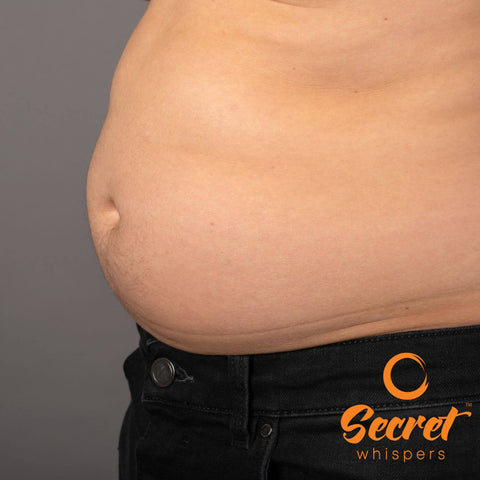Bloating, Prolapse and Pelvic Floor Dysfunction - What You Need to Know
Updated Sept 2024

Bloating is a common issue that many women experience, often causing discomfort and distress. However, what some may not realize is that bloating can be linked to pelvic floor dysfunction.
In this blog post, we will delve into the relationship between bloating and pelvic floor dysfunction, exploring the causes and offering practical solutions to help you find relief.
What Is Bloating?
Bloating is the feeling of fullness or tightness in the abdomen, accompanied by an increased abdominal girth. It is often characterized by a distended belly, discomfort, and a sensation of pressure.
Various factors can contribute to bloating, including gas, water retention, constipation, overeating, needing to empty your bowels and hormonal changes.
While bloating can be a temporary condition, chronic or frequent bloating may be a sign of an underlying issue, such as pelvic floor dysfunction.
Can Pelvic Floor Dysfunction Cause Bloating?
Yes, pelvic floor dysfunction can cause bloating. The pelvic floor refers to a group of muscles that support the pelvic organs, including the bladder, uterus, and rectum. When these muscles become weakened or dysfunctional, it can lead to a range of symptoms, including bloating.
Pelvic floor dysfunction can interfere with the proper functioning of the digestive system, resulting in slowed digestion, constipation, and increased gas accumulation, which contribute to bloating.
Additionally, the weakened pelvic floor muscles may fail to support the abdominal organs adequately, leading to a protruding belly and further exacerbating the sensation of bloating.
Can Prolapse Cause Bloating?
Yes, prolapse can be linked to bloating in as much as pelvic organ prolapse is one symptom of a weak pelvic floor, abdominal bloating can be too.
How to Treat Bloating and Pelvic Floor Dysfunction
If you're experiencing bloating and suspect pelvic floor dysfunction as the underlying cause, there are several approaches you can take to alleviate the prolapse symptoms and promote pelvic floor health. Here's some tips to treat bloating and pelvic floor dysfunction:
Look At Your Diet
Making dietary changes can have a significant impact on reducing bloating and improving pelvic floor function.
Adding foods that support pelvic health, such as fruits, vegetables, whole grains, and lean proteins. These provide essential nutrients and fiber that aid in proper digestion and regulate bowel movements. They may also assist you in losing weight, which can also help pelvic floor issues.
On the other hand, it's important to avoid foods that can worsen bloating and pelvic floor dysfunction, including carbonated beverages, processed foods high in sodium, artificial sweeteners, and foods that cause gas, like beans and cruciferous vegetables. For more detailed information on a pelvic floor-friendly diet, you can check out this article Pelvic Floor Diet: Foods to Improve Pelvic Health and foods to avoid.
Pelvic Floor Exercises
Engaging in regular pelvic floor exercises, also known as Kegel exercises, can help strengthen the pelvic floor muscles and improve their function. These physical therapy exercises involve contracting and releasing the muscles that control urination and bowel movements.
At Secret Whispers our pelvic floor trainer weights help you do your kegel exercises correctly and build up tone in your pelvic floor, reducing bloating.
By incorporating pelvic floor exercises into your routine, you can enhance muscle tone, support the pelvic organs, and potentially reduce bloating.
To learn more about the purpose of pelvic floor exercises, how to identify if your pelvic floor is weak, and even get a step-by-step guide, you can refer to these informative articles:
- What is the Purpose of Pelvic Floor?
- How to Know if Your Pelvic Floor Is Weak
- How Long Does It Take to Tighten Pelvic Floor Muscles?
Manage Stress Levels
High levels of stress can contribute to bloating and worsen pelvic floor dysfunction. When you're stressed, your body releases hormones that can disrupt digestion and lead to bloating. Additionally, stress can cause tension and muscle tightness in the pelvic floor, further worsening symptoms.
Finding effective stress management techniques such as practicing mindfulness, deep breathing exercises, engaging in hobbies, or seeking support from a therapist can help reduce stress and improve pelvic floor health.
Hydration and Fluid Balance
Proper hydration is crucial for maintaining a healthy digestive system and reducing bloating. Ensure you drink an adequate amount of water throughout the day to support regular bowel movements and prevent constipation, which can contribute to bloating.
However, be mindful of consuming excessive amounts of carbonated beverages and drinks high in sugar or caffeine, as these can worsen bloating. Strive for a balanced fluid intake that includes water and hydrating beverages like herbal teas.
These are just a few strategies to address bloating and pelvic floor dysfunction. It's important to consult with a healthcare professional for a personalized approach based on your specific symptoms and medical history.
Bloating and pelvic floor dysfunction can have a significant impact on your quality of life, but by implementing these strategies, you can take steps toward finding relief.
If you want to learn more about bloating, pelvic floor health, and related topics, don't hesitate to explore the informative articles on our blog.
For further information or to stay updated with our latest posts, feel free to get in touch with us or subscribe to our newsletter. Together, let's prioritize our pelvic floor health and well-being.
Never miss another blog again. Sign up now to my weekly Newsletter. You will get a 10% discount code to use too. Just click below ⬇️⬇️⬇️
To learn more about how our Pelvic Floor Kegel Weights can help you improve your pelvic floor strength, just click here
If you would like to learn more about how Kegels (pelvic floor exercises) can help you. Sign up via the link below to be notified first when I run the next one.
Let me know in the comments below if this blog has helped you.
<strong>About the Author</strong>: Secret Whispers was founded by Julie Colan, a dedicated mum and health enthusiast who identified a gap in effective pelvic floor strengthening solutions. Driven by her own experiences, Julie developed the secret whispers pelvic floor trainer and worked to improve pelvic floor awareness and education. Helen Rankin, who founded <a href="https://www.cheekywipes.com/">Cheeky Wipes</a> and <a href="https://www.cheekypants.com/">Cheeky Pants</a> and developed a range of environmentally friendly 'Simple Reusables', has now taken over Secret Whispers. Helen brings a wealth of experience in sustainable product development, recognised by the prestigious Queens Award in Enterprise for Sustainable Development in 2021. Together, their shared mission continues to empower women with reliable health and wellness solutions.












